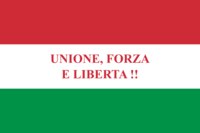La Giovine Italia
 |
|
| Formation | July 1831 |
|---|---|
| Type | Conspiratorial organization |
| Purpose | Italian unification |
|
Key people
|
Giuseppe Mazzini |
Young Italy (Italian: La Giovane Italia) was a political movement for Italian youth (under age 40) founded in 1831 by Giuseppe Mazzini. Its goal was to create a united Italian republic through promoting a general insurrection in the Italian reactionary states and in the lands occupied by the Austrian Empire. Mazzini's belief was that a popular uprising would create a unified Italy.
The Giovine Italia was founded in France, in July 1831 when Mazzini was in exile. Its members adopted nicknames taken from figures of the Italian Middle Ages. In 1833 many of the members who were plotting a revolt in Savoy and Piedmont were arrested and executed by the Sardinian police. After another failed Mazzinian revolt in Piedmont and Savoy of the February 1834, the movement disappeared for some time, reappearing in 1838 in England. Further insurrections in Sicily, Abruzzi, Tuscany, Lombardy-Venetia, Romagna (1841 and 1845), Bologna (1843) failed. Also short-lived was the Roman Republic of 1848–49, which was crushed by a French Army called in to help by Pope Pius IX. That Pope was initially hailed by Mazzini as the most likely paladin of a liberal unification of Italy, but he turned into the leader of the reactionaries.
Similar movements were set up around Europe by Mazzini himself. La Giovine Italia became affiliated with the movement Giovine Europa (created in 1835), an internationally oriented association, together with similar movements such as Junges Deutschland, Młoda Polska, Young Turks and Giovine Svizzera. It also inspired Mlada Bosna, early-20th century Serbian revolutionary movement in occupied Bosnia and Herzegovina.
Mazzini's movement was basically evicted after a last failed revolt against Austria in Milan in 1853, crushing hopes of a democratic Italy in favor of the Piedmontese monarchy. It achieved national unification in 1860 under the leadership of Count Cavour.
...
Wikipedia
